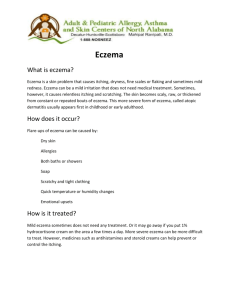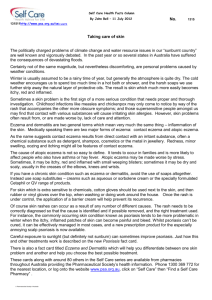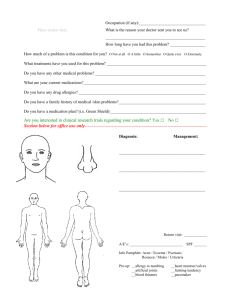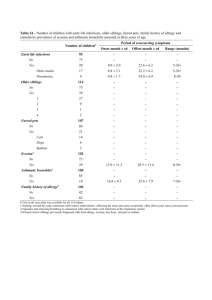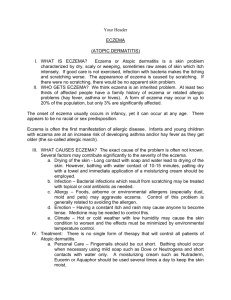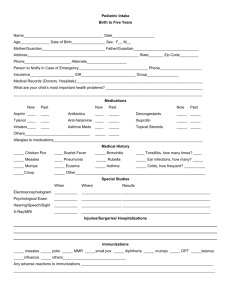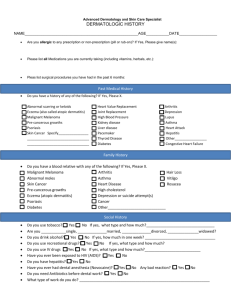1405 - Eczema awareness - Pharmaceutical Society of Australia
advertisement
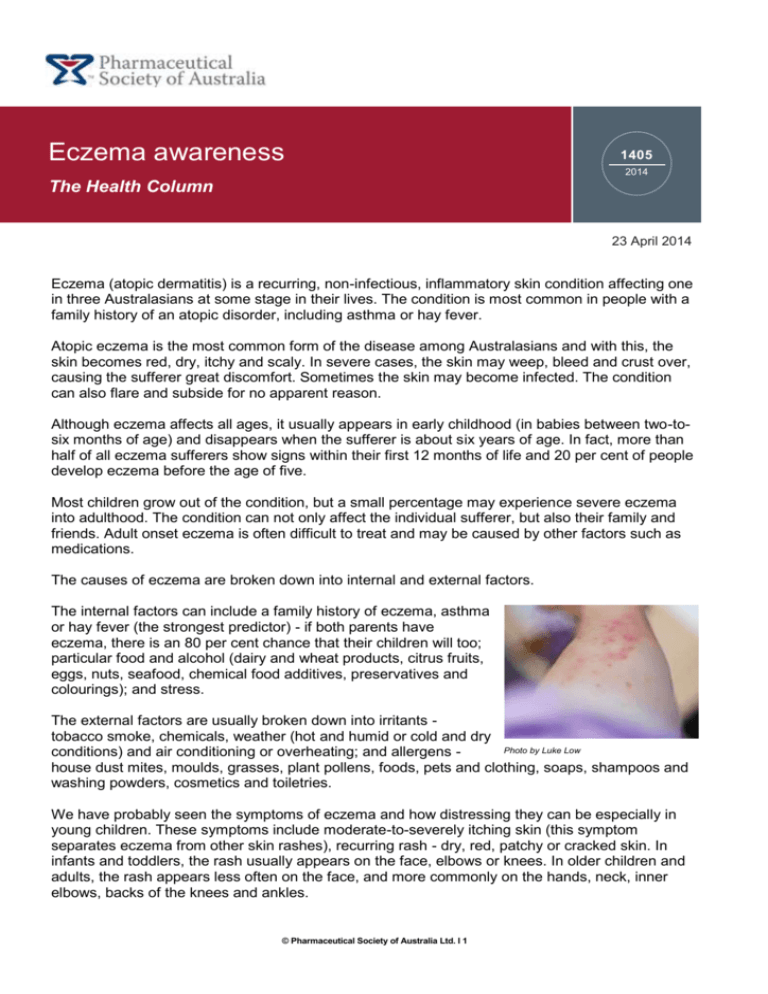
Eczema awareness 1405 2014 The Health Column 23 April 2014 Eczema (atopic dermatitis) is a recurring, non-infectious, inflammatory skin condition affecting one in three Australasians at some stage in their lives. The condition is most common in people with a family history of an atopic disorder, including asthma or hay fever. Atopic eczema is the most common form of the disease among Australasians and with this, the skin becomes red, dry, itchy and scaly. In severe cases, the skin may weep, bleed and crust over, causing the sufferer great discomfort. Sometimes the skin may become infected. The condition can also flare and subside for no apparent reason. Although eczema affects all ages, it usually appears in early childhood (in babies between two-tosix months of age) and disappears when the sufferer is about six years of age. In fact, more than half of all eczema sufferers show signs within their first 12 months of life and 20 per cent of people develop eczema before the age of five. Most children grow out of the condition, but a small percentage may experience severe eczema into adulthood. The condition can not only affect the individual sufferer, but also their family and friends. Adult onset eczema is often difficult to treat and may be caused by other factors such as medications. The causes of eczema are broken down into internal and external factors. The internal factors can include a family history of eczema, asthma or hay fever (the strongest predictor) - if both parents have eczema, there is an 80 per cent chance that their children will too; particular food and alcohol (dairy and wheat products, citrus fruits, eggs, nuts, seafood, chemical food additives, preservatives and colourings); and stress. The external factors are usually broken down into irritants tobacco smoke, chemicals, weather (hot and humid or cold and dry Photo by Luke Low conditions) and air conditioning or overheating; and allergens house dust mites, moulds, grasses, plant pollens, foods, pets and clothing, soaps, shampoos and washing powders, cosmetics and toiletries. We have probably seen the symptoms of eczema and how distressing they can be especially in young children. These symptoms include moderate-to-severely itching skin (this symptom separates eczema from other skin rashes), recurring rash - dry, red, patchy or cracked skin. In infants and toddlers, the rash usually appears on the face, elbows or knees. In older children and adults, the rash appears less often on the face, and more commonly on the hands, neck, inner elbows, backs of the knees and ankles. © Pharmaceutical Society of Australia Ltd. I 1 In addition or separately there may be rough, "leathery," thick skin or lesions which may be infected by bacteria or viruses. However, there are many things that can be done to avoid an eczema outbreak and your pharmacist can provide a lot of advice in this area. Most importantly, the skin should be kept moist by using avoiding soap and applying a daily moisturiser. Other ways to prevent an outbreak include: Wearing 100 per cent cotton or soft fabrics - avoiding rough, scratchy fibres and tight clothing Using rubber gloves with cotton liners Having lukewarm baths and showers using a non-soap cleanser or hypoallergenic bath oil Gently patting, not rubbing, the skin dry with a soft towel Applying a moisturiser within three minutes after bathing to "lock in" the moisture When possible, avoiding rapid changes of temperature and activities that raise a sweat Removing carpets and rugs from houses (if possible) and keeping pets outside Ventilating the house as often as possible Avoiding stuffed toys which harbour dust mites Changing bed linen regularly, using specialized dust mite prevention covers Reducing daily stress Your local community pharmacy is your health destination and your Self Care pharmacist can give you more information about issues affecting eczema. Your local Self Care pharmacy also has a range of fact cards covering Eczema and dermatitis which can help you. For the nearest location phone the Pharmaceutical Society on 1300 369 772 or check the website www.psa.org.au and click on Self Care Pharmacy Finder. © Pharmaceutical Society of Australia Ltd. I 2
